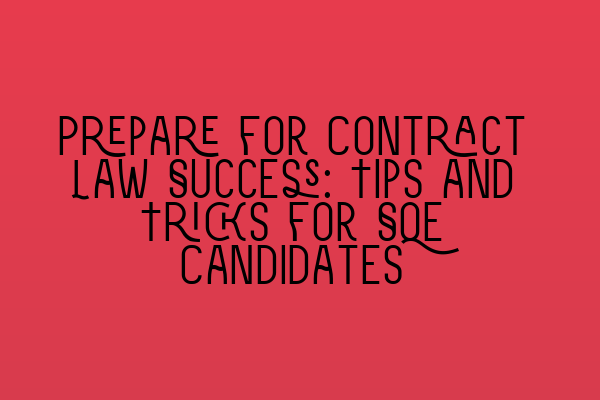Prepare for Contract Law Success: Tips and Tricks for SQE Candidates
Are you a aspiring solicitor planning to take the SQE contract law examination? Contract law is a critical component of the SQE assessment, and careful preparation is essential for success. In this blog post, we will provide you with some valuable tips and tricks to help you ace the contract law section of the SQE exam.
Before we delve into the details, let’s briefly outline what the SQE is. The Solicitors Qualifying Examination (SQE) is a new two-part assessment introduced by the Solicitors Regulation Authority (SRA) to assess the competence of aspiring solicitors in England and Wales. The SQE assesses candidates on their practical legal skills and knowledge, covering various areas of law, including contract law.
Now, let’s move on to the tips and tricks that will help you excel in the contract law section of the SQE exam:
1. Understand the Legal Principles:
Contract law is based on a set of legal principles and rules that govern agreements between parties. It is crucial to have a solid understanding of these fundamental principles, such as offer and acceptance, consideration, intention to create legal relations, and capacity to contract. Familiarize yourself with these key concepts to ensure a strong foundation for addressing contract law questions.
2. Study Relevant Case Law:
Contract law is heavily influenced by case law, and understanding landmark cases will enhance your understanding of the subject. Make a comprehensive list of significant contract law cases and study them in detail. Analyze the facts, legal principles, and outcomes of these cases to develop a nuanced understanding of contract law.
3. Focus on Contract Formation:
Contract formation is a critical aspect of contract law and often forms the basis of exam questions. Pay close attention to the requirements for a valid contract, including offer, acceptance, consideration, and intention. Familiarize yourself with the various scenarios and factors that may impact the formation of a contract, such as counteroffers, revocation, and lapse of time.
4. Master Contractual Interpretation:
Interpreting contract terms accurately is crucial for understanding the rights and obligations of the parties involved. Study the rules and methods of contractual interpretation, including the objective approach, the contra proferentem rule, and the parol evidence rule. Practice applying these principles to hypothetical situations to sharpen your interpretative skills.
5. Learn Remedies for Breach of Contract:
Breach of contract is another key area of contract law. Understand the different types of breaches, such as material breaches, anticipatory breaches, and fundamental breaches. Familiarize yourself with the available remedies, including damages, specific performance, and injunctions. Develop a comprehensive knowledge of the factors that courts consider when awarding remedies for breach of contract.
6. Practice Exam Questions:
To excel in the SQE contract law examination, practice is crucial. Work through a variety of contract law exam questions under timed conditions to simulate the exam environment. This will help you manage your time effectively and develop a strategic approach to answering contract law questions. Our SQE 1 Practice Exam Questions article offers a useful resource to test your knowledge and skills.
7. Take Mock Exams:
In addition to practicing exam questions, taking mock exams is an excellent way to gauge your readiness for the actual SQE exam. Mock exams provide a realistic simulation of the exam experience and allow you to identify any areas where you may need further improvement. Our SQE 1 Practice Mocks FLK1 FLK2 article provides valuable insights into the format and structure of mock exams.
8. Enroll in Preparation Courses:
Consider enrolling in SQE 1 Preparation Courses to supplement your self-study efforts. These courses offer comprehensive coverage of all areas of the SQE exam, including contract law. Experienced instructors will guide you through the key concepts, case studies, and exam techniques to boost your chances of success. Our SQE 1 Preparation Courses article provides more information on available courses.
9. Stay Updated on Exam Dates:
Stay informed about the SRA SQE exam dates to ensure you plan your preparation effectively. This will help you allocate your time and resources efficiently and avoid any last-minute surprises. Our SRA SQE Exam Dates article provides a comprehensive overview of upcoming exam dates and registration deadlines.
In conclusion, success in the contract law section of the SQE exam requires a thorough understanding of the legal principles, case law, contract formation, contractual interpretation, and remedies for breach of contract. Practice, mock exams, and preparation courses will further enhance your chances of achieving an outstanding result in the SQE contract law assessment.
Take advantage of the resources and strategies outlined in this blog post, and remember to stay focused, dedicated, and organized in your preparation. Best of luck in your journey to become a qualified solicitor!
